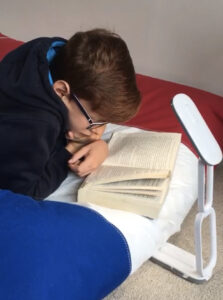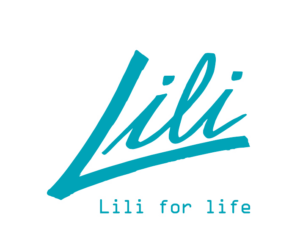The summer holidays are an ideal time to relax and recharge your batteries. But they also provide an excellent opportunity to help dyslexic children prepare for the start of the new school year. By following a few practical tips and using the right tools, parents can help their children strengthen their reading and comprehension skills, while having fun at the same time.
Establish a daily reading routine
Even during the holidays, it’s essential to maintain a reading routine. Dedicating 20 to 30 minutes a day to reading can make a big difference. Choose times of day when your child is most relaxed, such as after breakfast or before bedtime.
Tip: Use a lamp specially designed for dyslexics to make reading more comfortable and less tiring. This lamp helps to reduce eyestrain and improve concentration. This is the LILI lamp.
Choosing suitable books
It is important to choose books that are adapted to your child’s reading ability. Choose books with larger fonts, wide line spacing and well-structured text. Books with illustrations can also help to keep your child’s interest.
Suggestion: Ask your child to take part in choosing books. This can increase their motivation to read.
Use multisensory aids
Dyslexic children can benefit from multisensory aids to reinforce their learning. Reading apps, audio books and educational games can complement traditional reading and make learning more interactive.
Recommendation: Encourage your child to follow the text with their finger or a highlighter while listening to an audio book.
Set up a reading diary
A reading diary can help your child keep track of their progress and stay motivated. Encourage them to write a summary of each book they read, draw a favourite scene, or note down new words they have learnt.
Benefit: This not only develops reading skills, but also writing and artistic expression. Creativity is an exceptional quality in dyslexic people (read also)
Organise family reading workshops
Organise reading sessions where each member of the family reads aloud a passage from their favourite book. This can be a pleasant and encouraging moment for your child to share. It can also help forge special bonds (with grandparents, for example).
Tip: Use your LILI lamp to create a cosy reading atmosphere, even during evening workshops.
Reading outdoors
Take advantage of fine weather to organise outdoor reading sessions. Reading outdoors can be stimulating and offers a pleasant setting that can encourage a love of reading. Reading is an experience that should be connected to pleasant circumstances.
Tip: Make sure your child is comfortable and that the lighting is adequate, even outdoors.
Encourage complementary activities
Activities such as drawing, puzzles and board games can reinforce the cognitive and concentration skills needed for reading. These activities can be incorporated into your child’s daily routine in a fun way.
Take advantage of the holidays to visit museums, zoos, or historical sites. These outings can be complemented by reading brochures or explanatory panels on site. They provide an excellent opportunity to enrich your child’s vocabulary and encourage them to read more to find out more.
Example: Use word games or crosswords to make learning fun. Decipher and cook new recipes together.
Prepare for a smooth transition back to school
As the new school year approaches, start gradually reintroducing school routines, such as regular bedtimes and set work times. Talk to your child about his or her expectations and apprehensions regarding the new school year.
Tip: Visit the school or classroom in advance if possible, so that your child can familiarise themselves with the environment.
Contacting teachers
If possible, get in touch with your child’s future teachers to discuss his or her specific needs. Provide them with information about the tools and methods that work well for your child.
Importance: Good communication with the school can help your child adapt better from the start of the school year.
Use technological tools
Technological tools can be a great help for dyslexic children. Adapted reading applications, voice recognition software and tablets can make learning more accessible and engaging (Read also)
Remember: Your special dyslexia lamp can also play a crucial role in providing optimal lighting and reducing eyestrain.
Preparing for the start of the school year over the summer can be a rewarding and enjoyable process. By setting up suitable activities and using specific tools, you can help your dyslexic child to strengthen their reading skills and face the new school year with confidence. Do not forget that encouragement and patience are essential in supporting your child’s learning journey.








